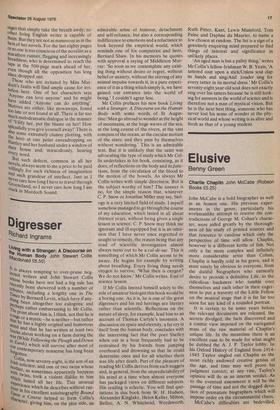big resser
Richard Ingrams
tLiving with a Stranger: A Discourse on "e,.. Human Body John Stewart Collis Racdonald E6.50) lit is always tempting to over-praise negected writers and John Stewart Collis Whose books have not had a big sale has 'teCently been showered with a number of Tri.butes, including a lengthy one in The ti",. es by Bernard Levin, which have if any..ing been altogether too eulogistic and 12rtrhaps rather embarrassing to Mr Collis. a he Point about him is, I think, not that he is thsage or a mystic — he is neither —but rather
at he has a highly original and humorous
Ind and that he has written at least two uooks about working on a farm during the twar (While Following the Plough and Down Earth) which will survive after most of fur contemporary nonsense has long been `ergotteri.
now seventy-eight, is the son of an ish solicitor, and one of two twins whose ,41,0ther, as sometimes apparently happens wvvith twins, took a violent dislike to him e hich lasted all her life. This unusual e03(13erience which he describes without ranill his excellent autobiography Bound of" a Course helped to form Collis's aracter, giving him, on the plus side, an
admirable seise of humour, detachment and self-reliance, but also a corresponding indifference to emotions and a reluctance to look beyond the empirical world, which reminds one of his compatriot and hero, Bernard Shaw. In his memoirs he quotes with approval a saying of Middleton Murray: 'So soon as we contemplate any existing thing without desire or regret, without belief or anxiety, without the stirring of any animal impulse towards it, in a pure experience of it as a thing which simply is, we have gained our entrance into the world of being.' I couldn't agree less.
Mr Collis prefaces his new book Living with a Stranger: A Discourse on the Human Body with some words, of St Augustine:Wen go abroad to wonder at the height of mountains, at the huge waves of the sea, at the long course of the rivers, at the vast compass of the ocean, at the circular motion of the stars; and they pass by themselves without wondering.' This is an admirable text. But it is unlikely that the saint was advocating the type of study which Mr Collis undertakes in his book, consisting, as it does, of reflections on the body and itsfunctions, from the circulation of the blood to the motion of the bowels. As always Mr Collis writes with simple directness. But is the subject worthy of him? The answer is no, for the simple reason that, whatever C. P. Snow or Jonathan Miller may say, biology is a very limited field of study. I myself somehow managed to go through the course of my education, which lasted in all about thirteen years, without being given a single lesson in science. C. P. Snow may think me ignorant and ill-equipped but it is an omission that I have never once regretted or sought to remedy, the reason being that any road of scientific investigation almost always turns out to be a cul-de-sac. This is something of which Mr Collis seems to be aware. He begins for example by writing about breathing. Every living thing needs oxygen to survive. 'What then is oxygen? We do not know,' Mr Collis writes. End of science lesson.
If Mr Collis limited himself solely to the role of amateur biologist this book would be a boring one. As it is, he is one of the great digressers and his red herrings are literary rather than scientific. Reflections on the nature of sleep, for example, lead him to an account of Thomas Carlyle's insomnia. A discussion on space and eternity, a far cry in Itself from the human body, concludes with the interesting fact that the poet Shelley when out in a boat frequently had to be restrained by his friends from jumping overboard and drowning so that he could determine once and for all whether there was life after death. Part of the pleasure of reading Mr Collis derives from such nuggets and, in general, from the unpredictability of his mind at a time when almost everyone has packaged views on different subjects. His reading is eclectic. You will find quotations in this book from W. H. Hudson, Alexander Kinglake, Helen Keller, Milton, Belloc, A. N. Whitehead, Wordsworth, Ruth Pitter, Kant, Lewis Mumford, Tom Paine and Daphne du Maurier, to name a few chosen at random. The list is a sign of a genuinely enquiring mind prepared to find things of interest and significance in unlikely places. 'An aged man is but a paltry thing,' writes Mr Collis's fellow-Irishman W. B. Yeats, 'A tattered coat upon a stick/Unless soul clap its hands and sing/And J ouder sing for every tatter in its mortal dress.' Mr Collis's seventy-eight year old soul does not exactly sing over his tatters because he is still looking for answers in the world of science and is therefore not a man of mystical vision. But he is the next best thing, someone who has never lost his sense of wonder at the physical world and whose writing is as alive and fresh as that of a young student.






























 Previous page
Previous page